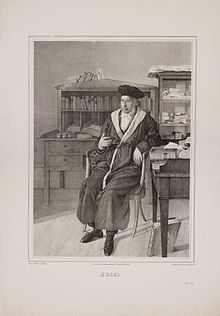Georg Wilhelm Friedrich Hegel
![]()
Hegel is a redirect to this article. For other meanings, see Hegel (disambiguation).
Georg Wilhelm Friedrich Hegel (* 27 August 1770 in Stuttgart; † 14 November 1831 in Berlin) was a German philosopher who is considered the most important representative of German idealism.
Hegel's philosophy claims to interpret the whole of reality in the diversity of its manifestations, including its historical development, in a coherent, systematic and definitive way. His philosophical work is one of the most influential works in the history of modern philosophy. It is divided into "Logic", "Philosophy of Nature" and "Philosophy of Mind", which includes, among other things, a philosophy of history. His thought also became the starting point for numerous other currents in the philosophy of science, sociology, history, theology, politics, jurisprudence and the theory of art; in many cases it also influenced other areas of culture and intellectual life.
After Hegel's death, there was a split among his followers into a "right-wing" and a "left-wing" grouping. The right-wing or Old Hegelians, such as Eduard Gans and Karl Rosenkranz, pursued a conservative interpretive approach in the sense of a "Prussian philosopher of the state", which Hegel had been declared to be during the Vormärz, while the left-wing or Young Hegelians, such as Ludwig Feuerbach or Karl Marx, derived and further developed a progressive socio-critical approach from Hegel's philosophy. Karl Marx in particular was influenced by Hegel's philosophy, which became known to him through Eduard Gans' lectures. Hegel's philosophy thus became one of the central starting points for Dialectical Materialism, which led to Scientific Socialism. Hegel also exerted a decisive influence on Søren Kierkegaard and existential philosophy, and later especially on Jean-Paul Sartre. Hegel's method of grasping the subject matter by bringing all of its views to bear allowed the most opposing representatives to invoke Hegel, and still do today.

Georg Wilhelm Friedrich Hegel, lithograph by Ludwig Sebbers
Memorials and places of work
The Hegelhaus Stuttgart houses a permanent exhibition on Hegel's life. In his honour, the city of Stuttgart awards the international Hegel Prize every three years. The oldest and most important association dedicated to Hegelian philosophy is the International Hegel Society.
In numerous cities, streets or squares were named after the philosopher. Vienna's Hegelgasse in the 1st district, with several well-known schools and significant architecture, is a strong reference to the educational pioneer, where the world's first girls' grammar school was built by the women's politician Marianne Hainisch.
Division of the work
The Hegelian writings are divided in Hegelian research into fourteen sectors, which correspond partly to chronological and partly to systematic criteria:
- Early writings (youth writings)
- Jena critical writings
- Jena system designs
- Phenomenology of the mind
- Logic (small and large)
- Natural Philosophy
- Subjective mind
- Objective Mind (Basic Lines of the Philosophy of Law)
- Philosophy of history
- Political writings of the day
- Philosophy of art
- Philosophy of Religion
- Philosophy and history of philosophy
- Encyclopedia of the Philosophical Sciences
The texts can be further divided into three groups:
- Texts written by Hegel and published during his lifetime
- Texts written by him but not published during his lifetime
- Texts that were neither written by him nor published during his lifetime
The first group of texts includes Hegel's writings from the beginning of his time in Jena as well as his works in the journal Kritisches Journal der Philosophie, which he edited together with Schelling. Furthermore, these include his main works Phenomenology of Spirit, the Science of Logic, the Encyclopedia of the Philosophical Sciences and the Basic Lines of the Philosophy of Right. Furthermore, Hegel published only a few smaller works for topical occasions and for the Jahrbücher für wissenschaftliche Kritik.
Almost all of the writings in the second text group were not published in an authentic version until the 20th century. They include Hegel's manuscripts written in Tübingen and Jena, the Jena system drafts, the works from the Nuremberg period, and the manuscripts and notes from the Heidelberg and Berlin lecture activities.
The group of texts neither written nor published by Hegel makes up almost half of the texts attributed to Hegel. These include the lectures on aesthetics, philosophy of history, philosophy of religion, and history of philosophy, which were very important for Hegel's impact. These texts are student products, for the most part the result of the compilation of postscripts of Hegel's lectures.
Questions and Answers
Q: Who was Georg Wilhelm Friedrich Hegel?
A: Georg Wilhelm Friedrich Hegel was a German philosopher born in Stuttgart, Württemberg (now southwest Germany) who started the philosophical movement known as Hegelianism and is considered part of German Idealism.
Q: What did Hegel write about?
A: He wrote about history, politics, religion, art, logic and metaphysics.
Q: How difficult is it to read Hegel's books?
A: It can be quite difficult because his books deal with many different ideas at the same time.
Q: Who were some of the people influenced by Hegel's work?
A: People who agreed with him included Bradley, Sartre, Küng, Bauer, Stirner and Marx; while those who disagreed included Kierkegaard, Schopenhauer, Nietzsche, Heidegger and Schelling.
Q: When was Georg Wilhelm Friedrich Hegel born?
A: He was born on August 27th 1770.
Q: When did he die?
A: He died on November 14th 1831.
Q: Where was he born?
A:He was born in Stuttgart , Württemberg (now southwest Germany).
Search within the encyclopedia
